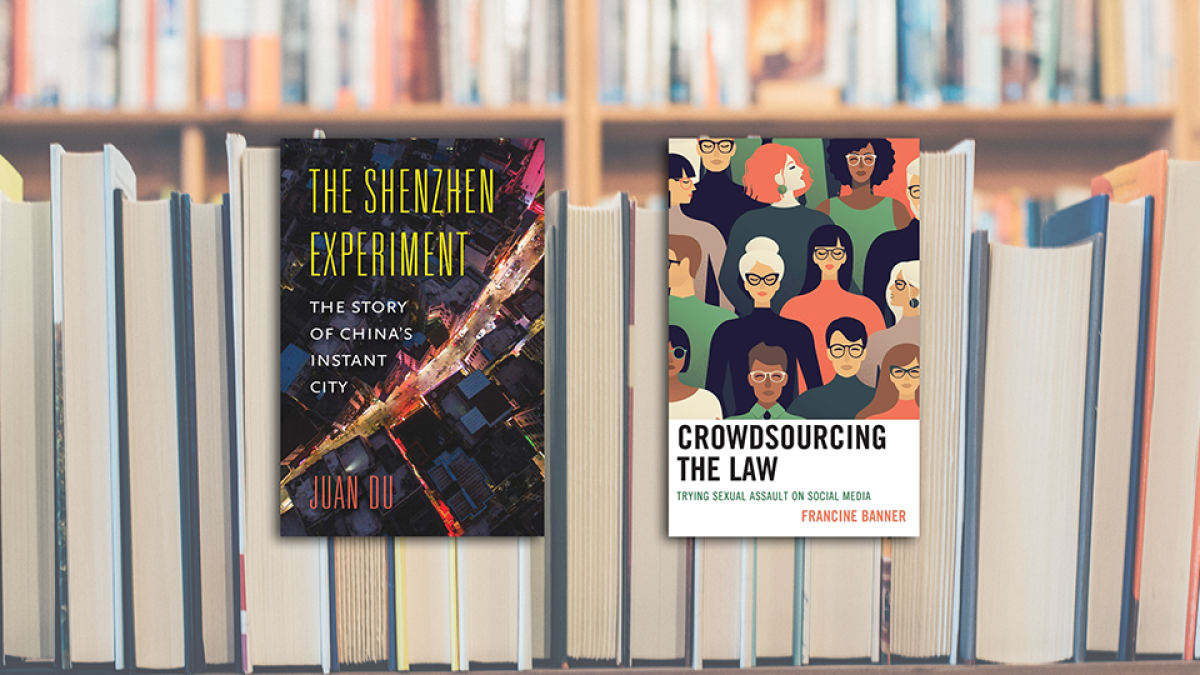Institute for Humanities Research announces 2020 Book Award winner

"The Shenzhen Experiment," by Juan Du, is the winner of the 2020 IHR Book Award. "Crowdsourcing the Law," by Francine Banner, received honorable mention. Background image courtesy of Unsplash
Arizona State University's Institute for Humanities Research has selected “The Shenzhen Experiment: The Story of China’s Instant City,” by Juan Du, as the 2020 IHR Book Award winner.
“The Shenzhen Experiment” tells the story of a rural borderland next to Hong Kong that became a booming metropolis and model for successful economic growth. Du's stories of urban villages and diverse communities show that the homogenizing narrative told by the state is not sufficient, said IHR Advisory Board member Anna Cichopek-Gajraj.
“The author debunks multiple myths around its rise, arguing that the city was not a simple top-down project or a sole success of the central government. Rather, it was a result of a long history of the region, dating back to antiquity,” said Cichopek-Gajraj, who is also an associate professor in the School of Historical, Philosophical and Religious Studies.
“It's a lesson for city planners around the world that local particularities are most consequential in whether or not a new urban project will thrive.”
Du, an architect and associate dean of the faculty of architecture at the University of Hong Kong, will present the “2020 IHR Book Award Lecture” for the ASU community on Oct. 8. Preceding her lecture, she will join ASU early-career scholars for “A Conversation with IHR Book Award Winner Juan Du” on Oct. 1.
In addition, “Crowdsourcing the Law: Trying Sexual Assault on Social Media,” by Francine Banner, received honorable mention in the competition.
Banner’s book explores how the public uses social media platforms to discuss, interpret and apply laws on sexual assault and violence.
“The question of what we know, how we come to know it, and whose knowledge matters are central to the humanities,” said Mary Margaret Fonow, IHR Advisory Board member, professor emerita of women and gender studies, and founding director of the School of Social Transformation.
“Banner tackles these questions in her brilliant analysis of how social-media platforms can be an important tool for creating alternative bodies of knowledge about rape and sexual assault.”
Banner, associate professor of sociology at University of Michigan-Dearborn, is an ASU alumna and received her PhD in justice studies from ASU in 2009. She will present “‘Crowdsourcing the Law’ with Francine Banner” for the ASU community on Oct. 15.
Established in 2008, the IHR Book Award is presented for a nonfiction work of humanities-based scholarship. The annual competition celebrates outstanding writers whose contributions to the humanities change the conversation by fostering new directions for their discipline.
More Arts, humanities and education

Grand Canyon National Park superintendent visits ASU, shares about efforts to welcome Indigenous voices back into the park
There are 11 tribes who have historic connections to the land and resources in the Grand Canyon National Park. Sadly, when the…
ASU film professor part of 'Cyberpunk' exhibit at Academy Museum in LA
Arizona State University filmmaker Alex Rivera sees cyberpunk as a perfect vehicle to represent the Latino experience.Cyberpunk…

Honoring innovative practices, impact in the field of American Indian studies
American Indian Studies at Arizona State University will host a panel event to celebrate the release of “From the Skin,” a…